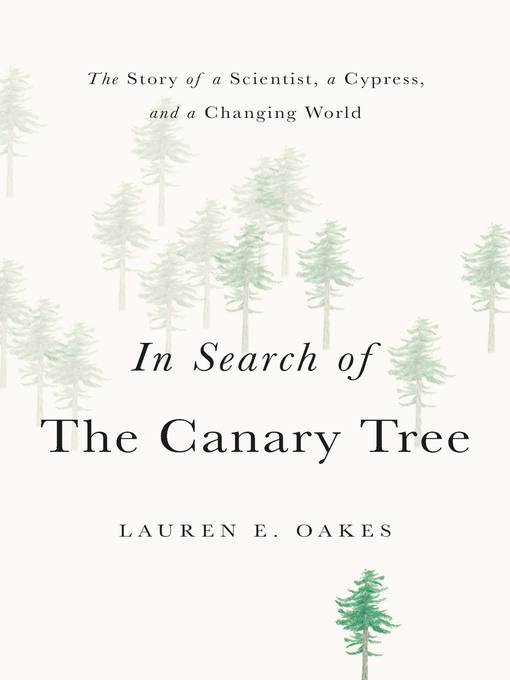
In Search of the Canary Tree
The Story of a Scientist, a Cypress, and a Changing World
کتاب های مرتبط
- اطلاعات
- نقد و بررسی
- دیدگاه کاربران
نقد و بررسی

August 20, 2018
Ecologist Oakes traces the slow death of the yellow cedar, alternatively known as the yellow cypress, in this significant ecological study. She chronicles a years-long investigation into the old-growth forests on Alaska’s “remote outer coast,” while suggesting that the yellow cedar’s recent decline, attributed to climate change and rising temperatures, might be the proverbial “canary in the coal mine—calling out for our own inevitable demise.” With innate curiosity and a strong sense of purpose, she talks with naturalists who recognize “the ecological value” of dead trees and “the habitat they create for birds the nutrients they add to the forest floor as they decay.” She speaks to indigenous weavers, too, and to loggers and land managers, all of whom offer unique perspectives. Oakes’s storytelling gets bogged down occasionally. Discussions of academic and scientific methodology, for example, can become dull. The narrative takes a turn for the rawly emotional, however, when Oakes’s father unexpectedly dies back in Virginia, and she finds herself grieving his passing and Alaska’s environmental deterioration simultaneously. In these passages, Oakes admirably melds the professional with the highly personal, ultimately delivering a work of sensitivity and philosophical grace. B&w illus. and maps.

September 15, 2018
Field research into why yellow-cedar trees are dying and how people dependent on it are coping with a changing environment.In her debut, Oakes, a conservation scientist at the Wildlife Conservation Society, presents a "blend of ecology and social science," looking for answers to scientific questions through meticulous, rigorous research on the Alexander Archipelago off the southeastern coast of Alaska. She also spent hours interviewing Alaskans coping with a rapidly shifting environment. Hardy, diligent, and empathetic, the author makes vividly clear the difficulties of conducting multiyear field research on a remote archipelago. The book, she writes, "chronicles my effort to answer what happens in the wake of yellow-cedar death, not only to uncover the future of these old-growth forests, but to share lessons that apply to people on other parts of the planet....If we start looking at the local picture and the ways in which we all depend on nature in various ways every day, solutions emerge. I witnessed this in Alaska." For armchair readers, this provides an unforgettable picture of just how scientists work in the field. Readers looking for a thorough understanding of the decline of the yellow-cedar tree will not be disappointed. The data are here, collected and painstakingly recorded by intrepid young people living rough, sometimes in tents and sleeping bags, eating dehydrated food, and slogging through chilly bogs in rain and fog. In between, there are the author's trips back to Stanford, where she was a graduate student and is now an adjunct professor. It's clear that Oakes is deeply concerned about what climate change--of which the decline of the yellow-cedar is but one marker--will mean in her lifetime and in the more distant future. How will we continue to adapt in the face of frightening changes?The canary-in-the-coal-mine image is a powerful one, and this book carries a potent message sure to resonate with conservationists.
COPYRIGHT(2018) Kirkus Reviews, ALL RIGHTS RESERVED.

October 15, 2018
Oakes (earth system science, Stanford Univ.) pays much-needed attention to Alaska's declining Yellow Cedar, a tree highly valued for economic and cultural reasons yet rapidly dying as a result of warming temperatures. The author, who is also a conservation scientist at the Wildlife Conservation Society, explores both biophysical (what happens to the forest plants after the cedars' demise) and social (how do people who rely on the tree adapt to the loss) aspects of the decline. Readers witness the extraordinary effort that comes along with advanced research, including the challenge of obtaining field measurements in remote areas and the discipline needed to mine the data. Oakes accomplishes it all while experiencing personal turmoil. Illustrations add visual interest to this nicely layered book; deeper down, there's a gnawing tension that runs throughout the narrative, and it originates with one of the author's interview subjects who warns of research that simply "monitor[s] species to extinction." VERDICT The meditative approach of this engaging memoir quietly builds to a poignant question: What can a threatened tree tell us about our own survival on an overheating planet?--Robert Eagan, Windsor P.L., Ont.
Copyright 2018 Library Journal, LLC Used with permission.

November 1, 2018
This unique title chronicles an ecologist's work tracking the impact of climate change on the yellow cedar, a tree that once thrived in the old-growth forests of Southeast Alaska. Avoiding an academic tone, Oakes infuses this chronicle with moments from her own life, including her uncertainty as a graduate student at Stanford seeking a research topic and the devastating shock of her father's death. Tales from the field involving work with her small research team on Chichagof and Baranof Islands provide some levity?to say there was a lot of rain would be a vast understatement, but the primary message here, both in her careful data analysis and numerous interviews with Alaskans who regard the yellow cedar as significant for very different reasons, is to ring a warning bell. There is a threshold for every species, she writes, yet another reminder of the dangers to life on earth with climate change underway. Oakes has special appeal as a compelling new voice in science writing, and readers interested in trees, forests, ecology, and environmental issues will enjoy her intriguing work.(Reprinted with permission of Booklist, copyright 2018, American Library Association.)

























دیدگاه کاربران